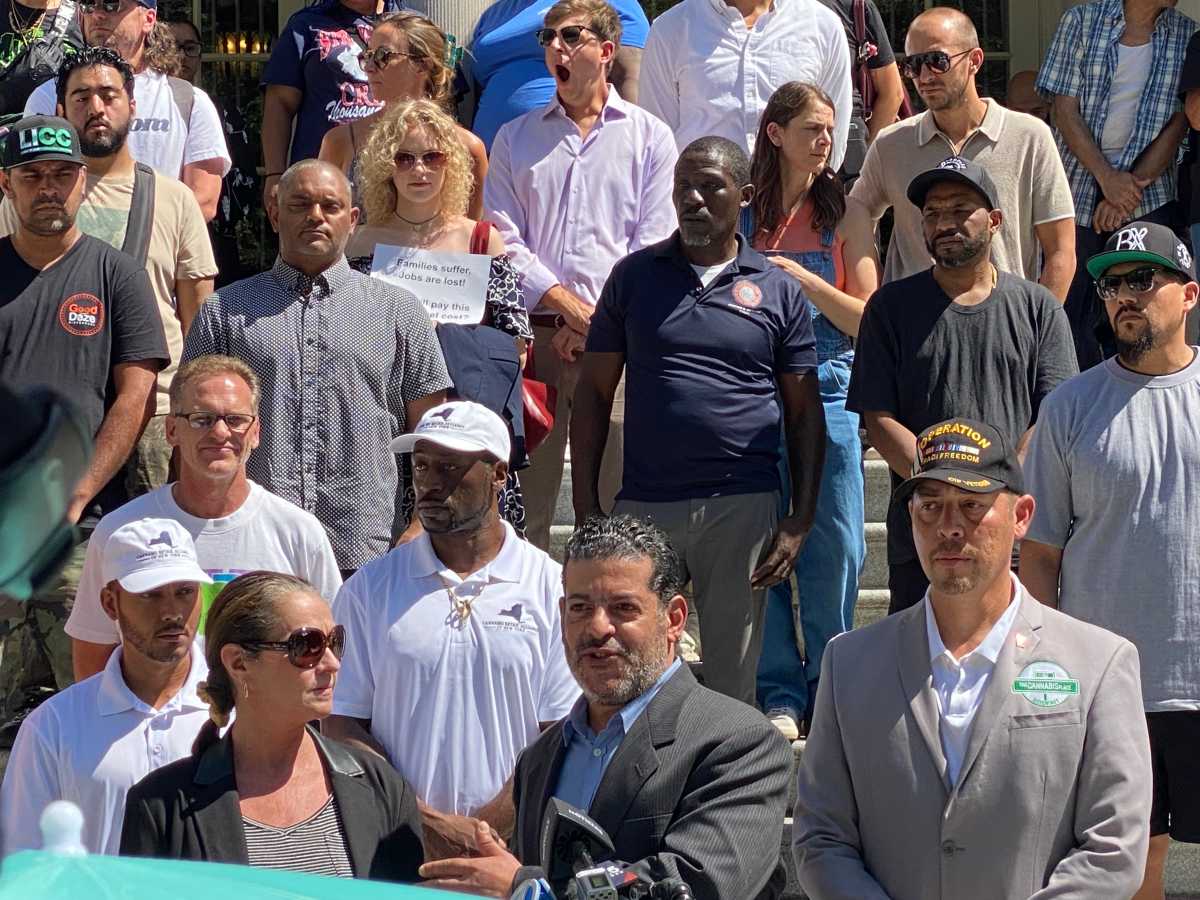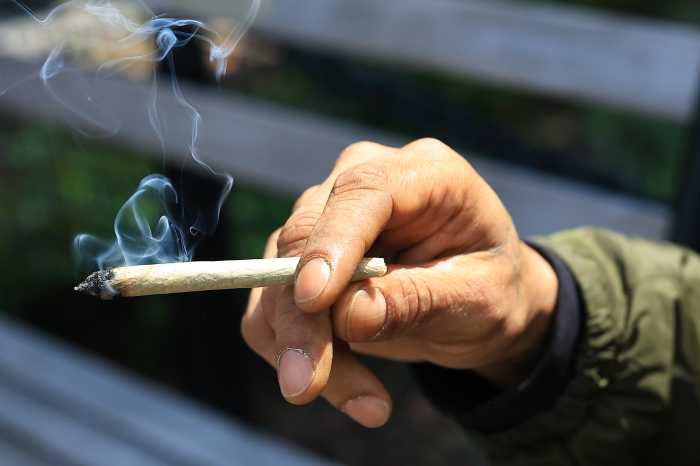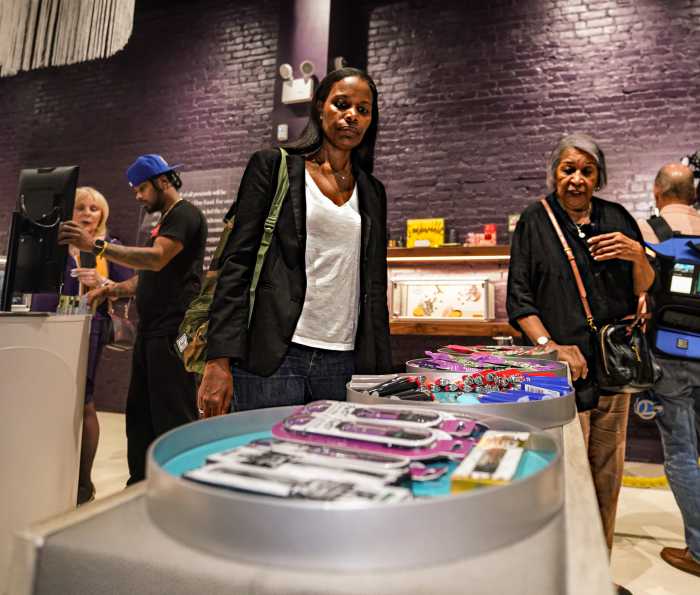As the blame continues to shift over the state Office of Cannabis Management’s (OCM) sudden change to how it measures its proximity rule, impacted dispensary owners rallied on the steps of City Hall on Friday, warning their livelihoods are at stake unless Gov. Kathy Hochul calls a special legislative session in October.
On July 28, OCM reinterpreted its 500-foot buffer rule to measure from a school or house of worship’s property line instead of its entrance, a shift that could force 108 licensed dispensaries, including 89 in New York City, to close or relocate despite prior approval under the old standard. Another 44 license applicants are also affected statewide.
The OCM and Gov. Hochul have since pledged support for the open dispensaries and license applicants impacted, saying that license holders with renewals due during the “limbo period” can continue operating under the State Administrative Procedures Act (SAPA). Both Hochul and the state body said a legislative remedy to the problem should play out when the legislature returns in January, but have acknowledged it is not a guarantee.
The governor has blamed “past OCM leadership” for the “screw-up,” saying businesses “will not be punished” for prior failures. But Chris Alexander, OCM’s former executive director who left last year after Hochul said she would not reappoint him, told NY1 Friday the change “wasn’t an oversight; it wasn’t a mistake — it was a choice” approved by the governor and other agencies after an 18-month review.
Dispensary owners and advocates who convened in Lower Manhattan on Aug. 8 said that while no one wants to take accountability, Hochul is the only one who can act immediately to save their businesses and the state’s cannabis industry.
They argue that the reassurances of the state are not enough as they try to continue operating under uncertainty. With January too long a wait, they want the state legislatures to reconvene early to pass legislation introduced this week by State Sen. Luis Sepúlveda that proposes grandfathering in any licenses that were approved in error.
Warning of ‘financial ruin’
“This was no mistake,” said Jillian Dragutsky, co-owner of Yerba Buena in Brooklyn. “I have a felony for cannabis. My father was incarcerated for cannabis,” she said during Friday’s rally. “What they’re doing is continuing the persecution of cannabis by following through with this rule.”
Her shop, which opened in March, employs 22 people and was “supposed to be about reparations,” she said, but now faces “financial ruin.”
“The truth is, the state had checks and balances, and they went through all the proper channels,” she said. “This was an attack by the current administration and a betrayal on cannabis. And I urge the governor and I urge the mayor to stand up for us.”
Brian Lane, compliance officer and co-founder of No Wave, one of the state’s largest processors, warned that the recent decision could unravel the entire cannabis supply chain. “This will cost the whole industry tens of millions of dollars,” Lane warned, adding that small brands and farms could disappear, and illicit shops would fill the gap.
Fernando Pena and Suzanne Furbote, husband and wife owners of Late Bloomers in Ridgewood, Queens, held hands tightly as they addressed the media, saying they are now at risk over a nine-foot proximity issue.
“Generational wealth was dangled in front of us. Now we’re gonna have generational debt,” Fernando said, inviting Hochul to visit the store where she will see how they have become “an asset to the community.”
“We’ve chosen to be custodians of this emerging industry,” he said, noting that Late Bloomers was one of the first 35 stores to be licensed by the state. “I think we’re doing great, but now we can’t sleep. Everybody’s getting paid. We’re paying for everything. We’re paying our loans, we’re paying our vendors, we’re paying our rent. We’re business people.”
He concluded by calling on state and city elected officials to get behind their cause: “I don’t want to go to financial jail.”

Nicole and Chris Lucien, owners of Bliss + Lex on the Upper East Side, also described how they had worked to turn their cannabis company into a community asset.
Chris told the crowd he had been released from prison in 2000 and spent years struggling to secure licenses for other businesses before finally qualifying to open a cannabis dispensary. “I felt like this is a perfect opportunity to provide generational wealth to my family, to my friends, to be able to help people less fortunate than I am,” he said, adding that their store now sponsors a youth basketball team.
Nicole added, “We’re not just selling cannabis. We are active members in our community… we’re making our neighborhoods safer.”
Nubia Ashley is among the license holders who were waiting for final approval to open their doors when she got word last week from the OCM that the location of her dispensary, Residue, is among those now in a non-compliant zone.
“We were supposed to be building generational wealth, and now my whole family is devastated,” she said. “I haven’t even gotten started. I’m one of the very few 100% women-owned dispensaries. I am in debt before I even get started to make a dollar.”
Alex Otero of The Bronx Joint said his Longwood shop is 15 feet over the new limit. Relocating, he said, would be “impossible” and urged Hochul to call a special session.






































